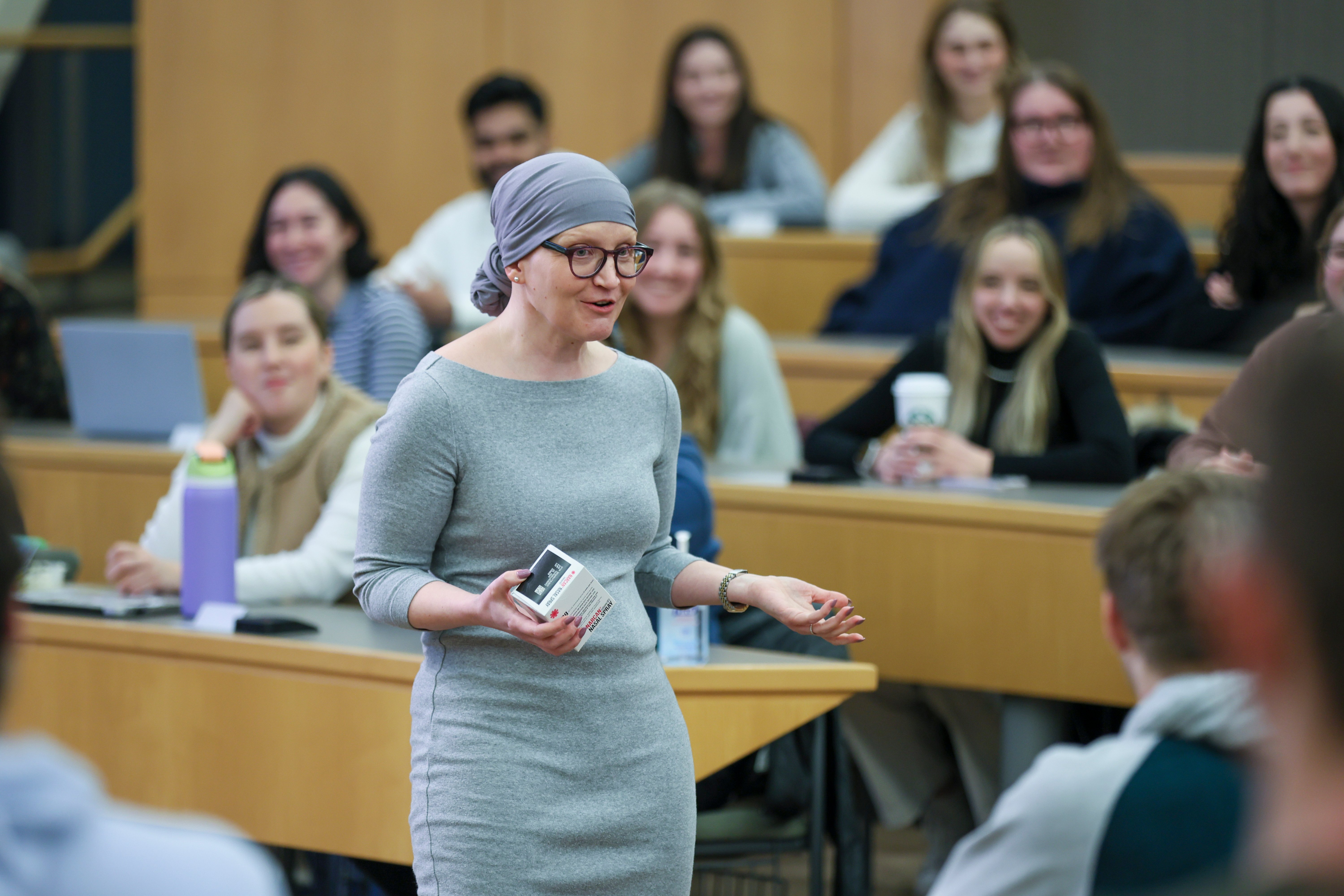Changing the Addiction Narrative
Researcher is decreasing stigma, increasing education to save lives
Seventeen months, one day.
This was the time between when addiction expert Dr. Cara Poland’s mother died, and her 24-year-old brother Max’s suicide—his young life cut short by depression complicated by alcohol addiction.
As a mother, and one who has suffered great personal losses, Poland has committed her life’s work to building a healthier world for her ten- and twelve-year-old children to grow up in.
Especially when the average age of first substance use is 12 years old.
In fact, excluding nicotine use, one in seven people have a substance use disorder; the number increases to one in four when tobacco use is included. In 2022, an estimated 2,998 Michiganders died of opioid overdose alone, that’s eight Michigan residents every day. And that is only opioid overdoses, this number doesn't include all opioid deaths or all substance-related deaths.
“When we see these statistics, we know it’s actually a gross underestimate,” Dr. Poland adds. “It is acutely obvious that we know how to apply medication, but there is huge disconnect between our workforce’s lack of training in treating alcohol and substance use disorders.”
Above (from left to right): Addiction advocate Steven S.; Dr. Cara Poland; and midwifery expert Nancy Renn-Bugai convene in the Pregnancy Center at Corewell Health. The three frequently collaborate on patients' substance and opioid use disorder care.
Below: Poland (left) and Renn-Bugai (right) personally make soft, handmade blankets to stuff into backpacks that are then given to expecting and new moms. The backpacks are filled with things like thermometers, clothing, and burp cloths.
Creating new pathways
A fierce advocate for opioid treatment and education, Cara Poland, MD, MEd, FACP, DFASAM, is a board-certified addiction medicine physician within the Michigan State University College of Human Medicine Department of Obstetrics, Gynecology and Reproductive Biology. Trained in internal medicine and addiction medicine, she is on the board of directors for the American Society of Addiction Medicine and chairs the Opioid Advisory Commission, which advises Michigan's legislature on the state's share of $800 million in Opioid Settlement funds intended to directly address the opioid, substance use and mental health crisis in Michigan.
Through her work on MI CARES—a unique pathway program educating providers on how to better treat those with substance use disorders—30 percent of the nationwide addiction specialty physician workforce participated in 2023 to support their specialty board certification.
To further support and expand the critical work of addressing substance use disorder for vulnerable and at-risk populations through treatment and education, Dr. Poland leads the Addiction Consortium on Research and Education Network (ACORN). The ACORN group unites faculty and staff across MSU who are working together to save lives through research, community engagement, advocacy, clinical care, and education. With increased funding, ACORN could initiate a university-wide translational network for addiction science to ultimately support more people.

Above: Poland teaches College of Human Medicine students how to recognize, be prepared for, and treat opioid overdose using Naloxone. One fourth-year MSU student in the class, Tessa Muench, said: "Dr. Poland has been an inspiration and a great mentor, supporting research opportunities and Spartan Street Medicine efforts, where we are bringing substance use treatments to unhoused patients who typically have had negative clinical interactions."
The greatest need
Attending physicians receive fewer than ten hours of addiction medicine training, making Dr. Poland’s work critical to public health and wellbeing. By turning personal tragedy into action, Dr. Poland has implemented training for more than 1,000 physicians in all 50 states.
While Poland's funding supports training for future Spartan MDs and residents, psychiatric nurse practitioner students, and social workers, with additional philanthropic funding, she could expand the program exponentially and support the need for educating all involved in treating substance use disorder. Additional funding would also empower Poland to continue advocacy efforts at the legislative level.
And because the addiction crisis has no end date, philanthropic support would provide the funding necessary to sustain Poland’s work. The need for an expanded addiction program at MSU is critical to radically transform substance use disorder treatment and care through workforce education across all health disciplines.
Making a difference, together
For the millions of families and friends to those suffering with substance use disorders, the time is now to provide access to safe, effective treatments—which is achievable through the physician and provider training Poland offers—MSU can help build resilient communities to ultimately make a difference for providers and the patients they treat.
Even though Cara Poland will never stop wondering if her brother’s death could have been prevented had he received evidence-based treatment, she is dedicated to creating safe, stigma-free, person-centered, evidence-based, and compassionate substance use disorder care accessible to all.
For more information on making a gift to support Dr. Poland's work at the MSU College of Human Medicine, call Associate Director of Development Marci Muller at (616) 234-2614 or mullerma@msu.edu.
Author: Sarah Enlow
Date: February 20, 2024

